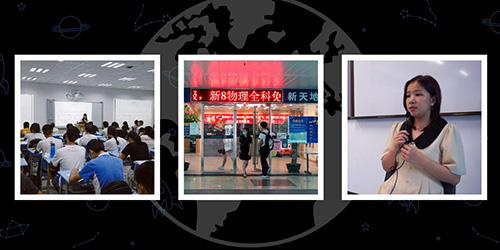This month, audiences can screen The Dilemma on the Planet Classroom Network. This film is curated by Planet Classroom.
The Dilemma: Extra-Curricular Institutions in China, directed by Huanshuo Wang, delves into China’s “cram school” system, revealing the impact of commercialized education on students and teachers. Through interviews and vivid storytelling, the documentary offers insights into the challenges and motivations within this unique academic landscape.
The Global Search for Education is pleased to welcome Huanshuo Wang
Huanshuo, what motivated you to focus on China’s extra-curricular education system?
As a student who received extra-curricular education from the age of 10, I have been thinking and questioning the system as a participant—What did I actually learn through these courses, and why is everyone taking them? During that time, there was also a lot of discussion in Chinese society about the issue of extra-curricular education. In 2021, the Chinese education department introduced the Double Reduction Policy (双减政策), aimed at reducing homework and after-school tutoring pressure on primary and secondary school students, reducing families’ spending on tutoring, and improving compulsory education. Government policy, social opinions, and my personal interest in China’s extra-curricular education system prompted me to make this documentary.
Can you share any challenges you faced while documenting this education model?
One particular challenge was interviewing 11 people from different positions and educational backgrounds. The student interviewees I chose came from different schools and education systems (some studied in the Chinese education system, while others were in international systems preparing to study abroad). It was challenging to coordinate these interviews, as I served as the interviewer, photographer, and director simultaneously. It was crucial yet difficult to ensure that the interviewees’ voices and images were properly recorded. On one occasion, I didn’t set up the sound devices correctly and failed to capture an interviewee’s voice, so we had to arrange another virtual meeting to redo the interview.
What impact do you hope the film has on viewers’ perceptions of China’s education system?
When I interviewed students, I found that some of them never questioned the purpose of attending extra-curricular classes; they simply went because their parents told them to, or because many of their peers attended. I don’t think there is a clear answer to whether the extra-curricular system is good or bad, but I hope students, parents, and teachers will reflect on its purpose. Do we think it’s necessary, and why do we need it in addition to the regular education system?
How do students and teachers feel about the pressures of “cram school” education?
Many students feel pressure to attend cram school due to the bandwagon effect. They see other students going, and they notice that their peers have already learned the answers to practice tests or quizzes in class. The desire to avoid falling behind and to gain the same “advantages” as others motivates students to attend cram schools. Teachers, however, worry that cram schools may reduce students’ ability and initiative to solve problems independently, as students may rely on pre-learned answers or formulas to pass tests.
Thank you, Huanshuo.
C. M. Rubin with Huanshuo Wang
Don’t miss The Dilemma, now streaming on the Planet Classroom Network. This film is curated by Planet Classroom.







Recent Comments